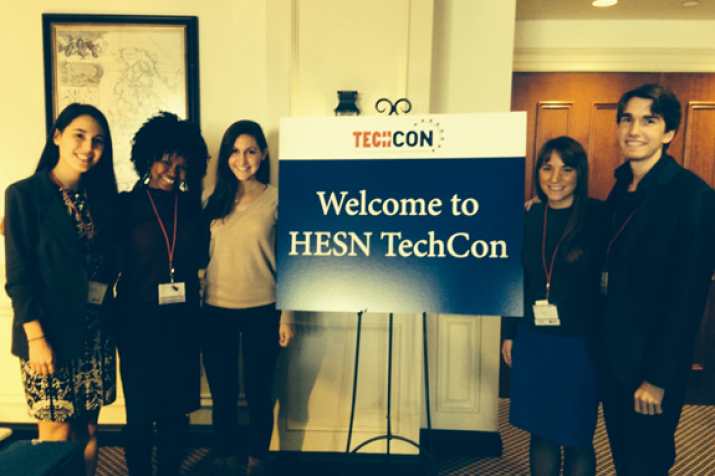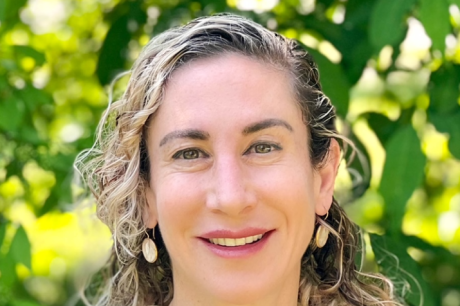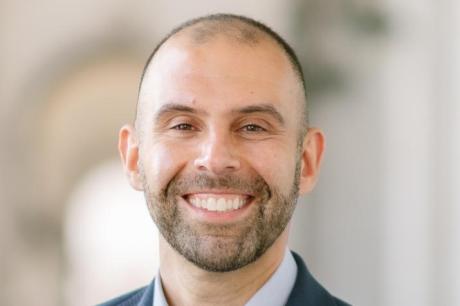
Sylvia (second from right) pictured with other Duke students at a USAID conference featuring 8 development labs and 7 universities, including Duke.
Published March 5, 2014, last updated on April 6, 2020 under Voices of DGHI
Having graduated in December 2013 with a Master of Science in Global Health from Duke University, I have had some time to reflect on my experiences. I imagined this reflection to be filled with newly mastered epidemiological methods, statistical packages and an in-depth understanding of the global health research process. While I find all of that to be true, there has been an addition to this list that has surprised me and become one of my most valuable experiences. It is my time spent working as a research assistant at The International Partnership for Innovative Healthcare Delivery (IPIHD) in Durham, North Carolina. IPIHD is a non-profit organization founded in 2011 by The World Economic Forum, Duke Medicine and McKinsey & Company to increase access to high-quality health care around the world by identifying transformative innovations in health care delivery and helping these models scale and replicate their impact. In addition to helping create the first profiles for innovators in the IPIHD network, I also got involved in The Social Entrepreneurship Accelerator at Duke (SEAD), a USAID development lab working with a number of innovators in the IPIHD network.
I have no doubt that the independent master's thesis is an amazing learning experience at Duke. However, it wasn't until I was able to witness and participate in the brainstorming process and strategy sessions at IPIHD that I was able to contextualize all the lessons learned, pitfalls and subsequent achievements from my thesis research. I got to see firsthand the careful balancing of stakeholder interests that is integral in the global health research workplace in a real-world situation.
As a research assistant at IPIHD and a student involved in SEAD, I saw the emerging global health research space from a bird’s-eye-view. From above you can see the organizations, trends and ways of thinking that push various global health agendas, as well as what your research does to improve health and well-being through action. After all, research is meant to inform action. Doing research for research’s sake, while important in some instances, seems inconsequential when people’s lives and well-being are at stake. During my time at IPIHD, the importance of balancing action and analysis has become more clear through thinking about our end-goal and what strategy to use to get there. I also better understand that research does not exist in a bubble and there are real social, financial and political barriers to what we can do.
Witnessing these barriers while being part of a forward-thinking and action-oriented team has been invaluable as I prepare for a career in the global health research space. I’ve learned that:
- Research is most valuable when it is practical and action-oriented
- Creating and carrying out a research agenda requires the ability to juggle stakeholder interests in such a way that your work benefits all parties
- Research CAN lead to action that improves lives (What we do matters!)
You will inevitably experience meetings where you leave feeling energized and ones that leave you feeling a bit confused about how to move forward given the larger context. My time working as a research assistant has given me some real experience navigating these ups and downs and coming to a solution that works for all those involved, a skill I hope to apply in my future endeavors.
Over my year and a half at Duke, I stumbled, fell and got back up countless times and I truly believe that the guidance I received during my research assistantship has left me more prepared to enter the workplace sensitive to the realities of getting research done in the context of competing stakeholder interests. Now more than ever, I believe in the importance of practical, useful research and am excited to improve my ability to recognize and navigate what motivates and drives people’s actions.
*Sylvia is now working as a Graduate Research Fellow at IPIHD in the Research and Knowledge Development Department.


